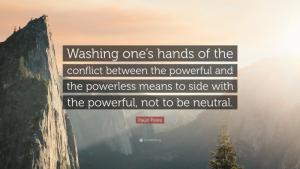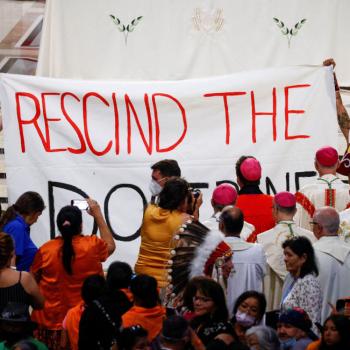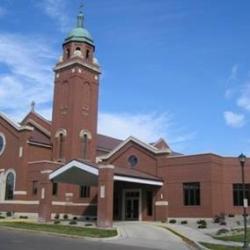
Paulo Freire was a Brazilian activist and academic. He taught, and led others to teach, literacy to impoverished, downtrodden, and despised people in Northeastern Brazil. Teaching for Freire wasn’t just imparting knowledge and skills. Education’s goal, he thought, was to help people discover themselves as “creative agents” in the process of lifting themselves up and changing their world. Before being vindicated by the worldwide scholarly community, Freire was imprisoned as a threat to Brazil’s elite. That was after a Cia-aided coup replaced the formerly favorable, leftist government in Brazil.
Is Freire’s career as pedagogue of the oppressed enough like Jesus’ work to make a good model? William Herzog thinks so. There’s the biblical record of the many times Jesus referred to poverty, riches, debt, and the working conditions of poor people in sermon and parable. Then there’s the fact that Jesus also was an enemy of the state, or was crucified as such. Herzog, along with many others, reasons that Palestine’s Roman overlords must have seen in Jesus a threat to their status and luxurious life, both of which came at the expense of the poor.
Paulo Freire and Jesus: Differences and similarities
If Paulo Freire, as pedagogue of the oppressed, is our model for understanding Jesus, then we should see similarities between each one’s careers. But differences strike the observer first. Herzog, in Parables as Subversive Speech, Chapter One, (See note below) details:
- Jesus was a poor villager and unknown to the world at large. Freire experienced poverty during the Great Depression but came from a middle-class, urban family and rose to worldwide fame.
- Jesus did not teach letters to illiterate people. He may not even have known letters very well. Freire wrote books and was published worldwide.
- Freire was familiar with the day’s intellectual currents, including Marxism, existentialism, and liberation theology. Jesus’ one source of learned wisdom was the Jewish Scripture. He knew how rabbis interpreted the Scriptures and developed his own reading of them.
- Jesus’ Palestine was occupied by Roman overlords. Freire’s Brazil had been an independent country for a century and a half.
With all those differences the similarities are still significant.
- Both Jesus and Freire were educators whose special concern was poor people.
- Both teachers lived in advanced agrarian societies. Jesus mostly ministered among poor peasants. Freire was more often among rural poor, less often among the peasantry. But agrarian peasants in both ages knew about urban systems; they depended on them. Freire’s peasant clientele was similar to that in Jesus’ time for another reason as the next point explains.
- Even though Freire’s Brazil had been independent for a century and half, a colonial mindset there was as strong, among both rich and poor, as it was among Jesus contemporaries.
- In both societies religious influence was strong, and leading religious figures identified and shared interest with the urban elite. Religion blessed the separation of classes and the impoverishment of the poor by the rich.
Why a model?
William Herzog’s method of interpreting the sources we have for Jesus’ life (mainly the Bible) differs from many scholars. It’s not enough, he says, to collect and analyze the historical data and let that fund lead to historical conclusions. That data are too incomplete and obscure. Interpretation will necessarily depend on the interpreter’s own view of the world and its possibilities. In fact, the conclusions that interpreters draw are about as numerous and contradictory as the mindsets they bring to their task. The problem, Herzog, says is focusing so intently on the data that personal bias operates in the background, hidden from awareness.
A better procedure is to work backwards. Start with a tentative conclusion, or model, based on preliminary and rough acquaintance with the historical data. Then see how well or badly the model fits a more thorough analysis of the data. Modify the model or throw the model out as the data require. This procedure brings personal bias out into the open.
“Generative words” and word pictures
As Herzog explains what Paulo Freire meant by “pedogogy of the oppressed,” we begin to see more similarities between this model and Jesus.
Brazil had literacy programs for the poor before Freire entered the scene. He called them “paternalistic.” Their manuals relied on middle class and elite words and images. That induced peasants, who valued literacy, to devalue their own language and culture. Similarly, the elite in Jesus time had ways to devalue the life experience of the poor.
In contrast to those government-sponsored literacy programs, Freire investigated the vocabulary of peasants and urban poor. He singled out “generative words,” words with rich meaning relevant to the people’s lives. Kim Diaz, in an Internet Encyclopedia of Philosophy article on Paulo Freire, says it might be a word like tijolo (brick). Paraphrasing Diaz:
A teacher would break the word into its syllables (ti-jo-lo). Students then would practice coupling the consonants with different vowels (ta, te, ti, to, tu; ja, je, ji, jo, ju; la, le, li, lo, lu). They’d combine the new syllables to make new words. Words like “land,” “economy,” and “culture” might arise and get talked about. In the conversation the class might come to a “limit situation,” a problem that participants and facilitator, by working together, could find a path through or around.
Already we see some similarity with Jesus. Freire’s literacy program used words that captured the rich experience of poor people’s lives. Jesus’ parables drew word pictures of common peasant experiences. Did these word pictures also evoke something like Paulo Freire’s “limit situations” for Jesus peasant hearers? That is what Herzog tries to show in his detailed analysis of several of Jesus parables. And that will be the theme of the next posts.
Image credit: Quotefancy











